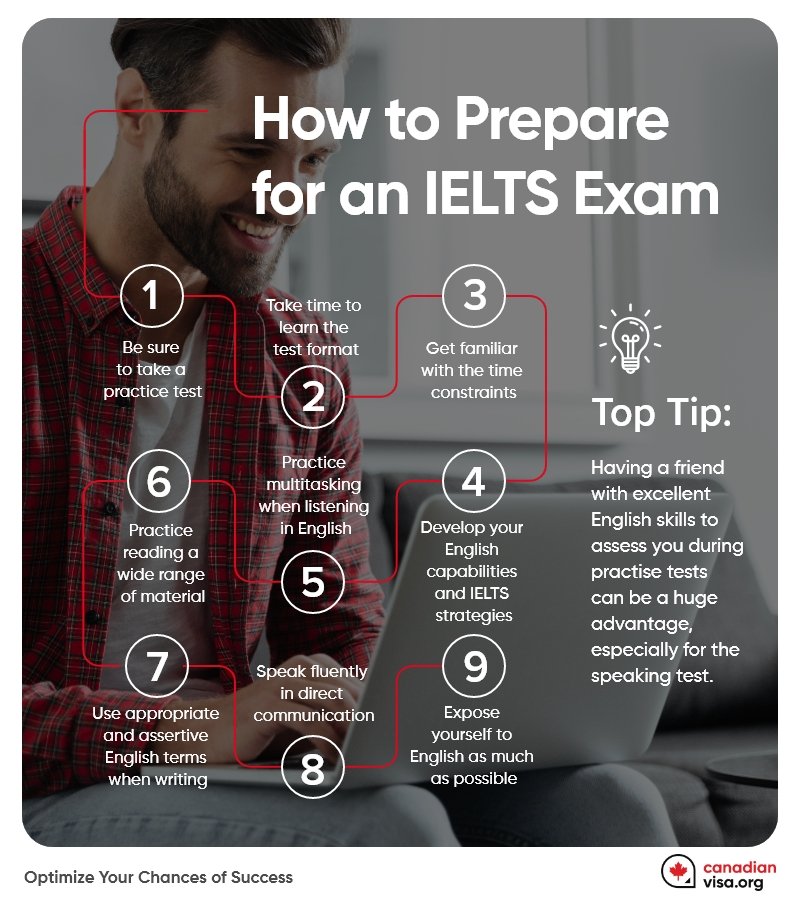IELTS is the most widely used and respected assessment of English language proficiency for governments and academic institutions. Having a good IELTS score is very important to the Canadian government, as this will show how well you communicate. Communication is extremely important to Canada as it will help you find work in the country and be a functional member of society.
A great IELTS score can also improve your chances of receiving a Canadian visa. Below we have listed how to prepare for an IELTS exam as well as British Council Tips.
Top Tips to Prepare for Your IELTS Exam

1. Be sure to take a practice test
By doing a practice test, you’re allowing yourself to discover what your strengths and weaknesses are. This will help you, as you now know which sections to put extra work in and to build on your strengths to create a solid foundation.
2. Take time to learn the test format
By reviewing the test structure, you will be able to familiarize yourself with the types of questions and tasks in each section. When you know what to expect you are less likely to feel overwhelmed and freeze.
3. Get familiar with the time constraints
Since learning the structure is now part of your preparation for the exam, you should be able to complete it within the time frame given. You need to practice the exam with the allocated time given to each section, this way you can become comfortable with answering the questions within a certain time.
By doing the above, you’ll always have a good idea of how you test under pressure and can improve on it if necessary.
4. Develop your English capabilities and IELTS strategies
Most people tend to only focus on the IELTS and forget that they need to improve their English as well, as the test is an English proficiency test. You should start preparing for your test at least three to six weeks before the time or more depending on your level of English.
Using an institution or taking a course that will help you with English development and IELTS strategies, would benefit you greatly.
5. Practice multitasking when listening in English
The listening module of the exam can get very demanding, you’ll need to answer 40 questions throughout four recordings. Each recording will only be played once. You’ll be answering questions that include completion, summary completion, form completion and multiple choice.
This is why it’s important to learn and understand how to follow a conversation. By doing so, you won’t get lost during the conversation and if you do, you’ll be able to recover much quicker. A great way to practice this would be to do a group activity or play a game with friends. This way you would need to think and speak in English.
6. Practice reading a wide range of material
When it comes to the reading part of the exam, you’ll need to be able to read to summarize, catch certain details, understand the writer’s opinions, attitudes and purpose. You’ll also need to understand logical arguments and be able to skim through the text.
You’ll need to provide short answers, match information, complete sentences, match headings or complete diagram labels. This is why you’ll need to practice strategies to avoid running out of time before all questions are answered.
7. Use Appropriate and Assertive English Terms When Writing
Most people struggle when it comes to the writing module because it requires a lot more English practice than the other modules. You’ll be given two writing tasks, they are:
- Task 1 - you will be presented with a situation and asked to write a letter requesting information, or explaining the situation. The letter may be personal, semi-formal or formal in style; and
- Task 2 - you will be asked to write an essay in response to a point of view, argument or problem. The essay can be reasonably personal in style.
8. Speak Fluently in Direct Communication
For the speaking section of the exam, you’ll have 15 minutes to complete it. This section is divided into three parts :
- The first 5 minutes are for introduction and general conversation between you and the examiner;
- In the second part of the test you’ll receive a random topic written on a task card, you’ll then be assessed on your ability to speak about the random topic; and
- The third part is a little more complex as the examiner will assess your pronunciation vocabulary and fluency.
It would be in your best interest to practice under the exam conditions and to practice talking about topics you aren’t that familiar with, as this will help you get used to the pressure of the actual test.
9. Expose Yourself to English as Much as Possible
Try and expose yourself to English as much as you can in your everyday life. Start listening to English music, radio or have conversations with native English speakers if possible. Practice writing in English and perhaps start an English diary of some sort. Through this, you’ll see how your English improves over time, as it’s a great way to prepare for an IELTS exam.
British Council Tips

Below are some tips from the British Council that most good language learners do, that help them achieve a good IELTS score.
- Good language learners notice their mistakes and learn from them.
- Do group activities.
- Make notes during every class. Notes help you to remember a new language.
- Use a dictionary. Good language learners often use dictionaries to check the meaning of words they don't know.
- Think in the language you're learning outside the classroom. When you're shopping or walking down the street, remember useful words and phrases. When you're at home, say new words to practice your pronunciation.
- Do extra practice. Test and improve your language, reading and listening skills with self-study material.
- Enjoy the process. Watch a TV series or film, listen to songs, play video games or read a book. It's never too late to become a good language learner.
Get Assistance With Your IELTS Exam
CanadianVisa.org has an online preparation course that includes explaining the exam, video lectures, practice exercises and strategies to help you succeed. You’ll be able to do writing samples which can be submitted and then reviewed, graded and commented on by qualified Canadian IELTS instructors.
With this course, you’ll be able to ask the instructors about the exam or anything related to how to prepare for an IELTS exam. Together with the course and the British Council tips, you should be well on your way to success.



